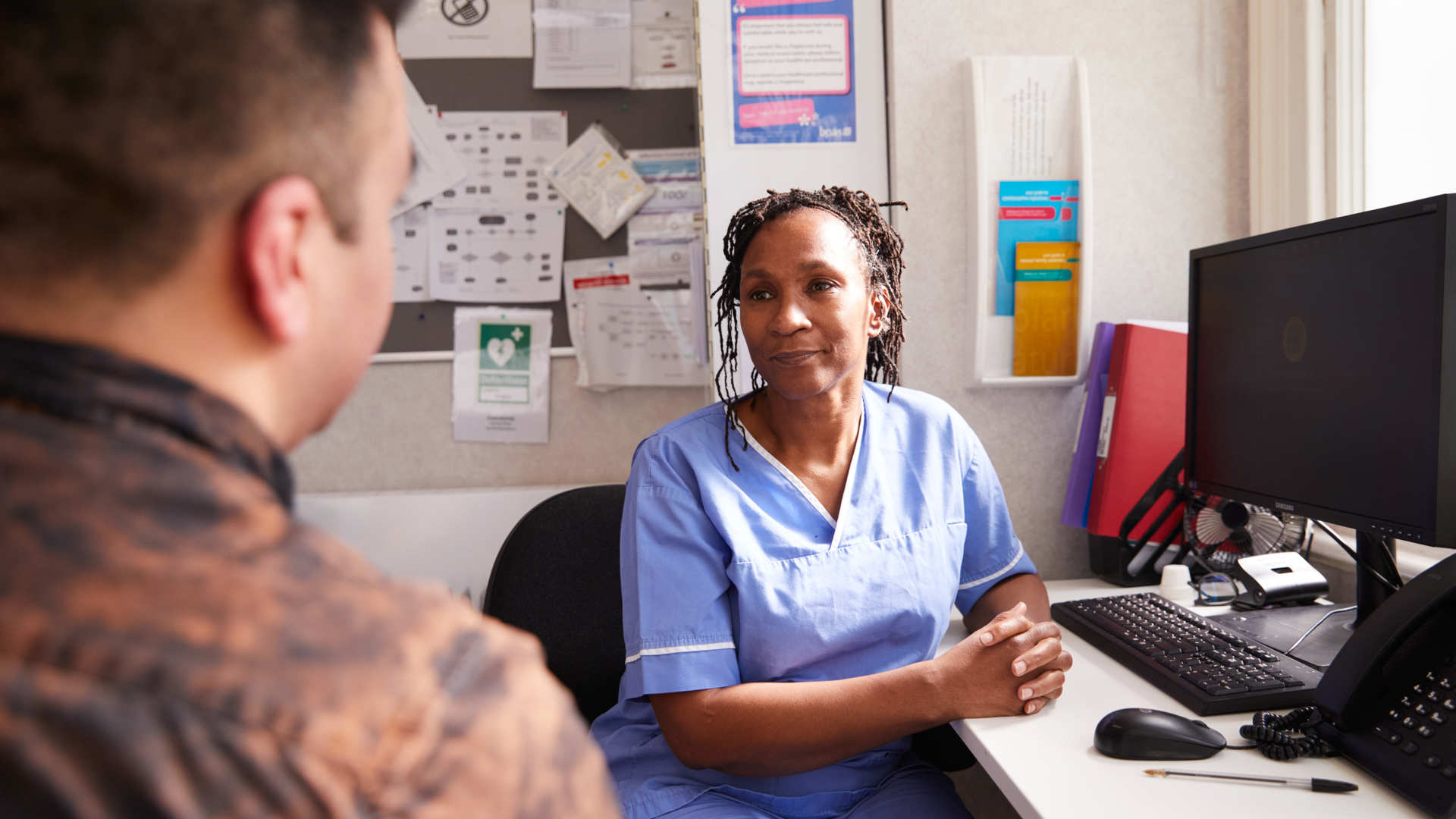Essential information
You may eat a light meal and drink before your treatment. Do not drink alcohol.

Consultation appointment
Your consultation appointment will last approximately an hour and will consist of some administration and medical assessments.
The first part of the appointment is a brief discussion where you will be asked to confirm your personal details. We will also discuss the reason you have chosen to have a vasectomy and whether you are sure of your decision. We will also discuss alternative methods of contraception.
You will be asked to complete a short questionnaire about your medical history. You may have received this medical questionnaire with your booking confirmation.
About vasectomy
Vasectomy is a permanent form of contraception for men. It is only suitable for men who are sure they never want children or do not want any more children.

Who can have a vasectomy?
It doesn’t matter if you are single, married, divorced, widowed, childless or with a family. Any man can have a vasectomy, regardless of his circumstances. The choice is up to you.
Vasectomy is safe and effective, but it is permanent, so you should only consider it if you are sure you never want children or do not want any more children. If you are under the age of 30 or have not had children, there may be a higher chance that you will regret having a vasectomy in future. You should know that vasectomy reversal is not routinely available on the NHS.
You shouldn’t consider a vasectomy if you are under stress, whether or not that stress relates to concerns about pregnancy or your relationship or anything else. If you are in a relationship, we strongly advise you to talk this through with your partner, however, their agreement is not required if you choose to proceed with a vasectomy.

How a vasectomy works
When you have sex, sperm travels through two tubes (vasa deferentia) and mixes with semen before you ejaculate. During vasectomy the tubes are either cut and tied or sealed, so that sperm cannot reach the semen. You still ejaculate, but your semen does not have any sperm in it, so the risk of pregnancy is extremely low. Vasectomy does not provide protection against sexually transmitted infections.
There are two types of vasectomy procedure, scalpel and non-scalpel. Both procedures result in the same thing. At BPAS we offer non-scalpel vasectomy with local anaesthetic.
The main difference between the two procedures is that with the scalpel method a small incision is made in the scrotum with a small sharp blade to access the tubes (vasa), while the non scalpel method uses either cautery or a specially designed instrument to enter the scrotum. Don’t worry, you will be given an anaesthetic so you do not feel this.
This procedure usually takes 15-20 minutes, and follows these steps:
Step 1. The first step is to inject local anaesthetic into the skin at the side of your scrotum to numb the area.
Step 2. Using a cautery or a fine instrument, the surgeon will make a small opening in the skin of the scrotum.
Step 3. The tube is then cauterised and sealed.
Step 4. A small piece of the tube is then removed.
Step 5. This is repeated on the other side. Sometimes a second entry point is made, or sometimes both tubes can be reached through the same opening. The surgeon places the tube back into your scrotum.
Step 6. If necessary, a dissolving stitch or two will be used to close the incision or entry point and a dressing will be placed over the wound.
Significant, unavoidable or frequently occurring risks
- Sore and tender scrotum, minor bruising and swelling of scrotum
- Infection
- Bleeding during procedure or after
- Blood clot in scrotum (haematoma)
- Sperm granuloma
- Chronic testicular pain (1-2 in 100 men)
- Failure of procedure or recanalisation in future
- The overall risk of failure is 1 in 2,000
- Failure at time of surgery or early recanalisation (rejoining) of the vas deferens occurs in 3.6 in 1,000 of cases
- Late failure or recanalisation (rejoining) of the vas deferens has been reported in 4 - 8 in 10,000 of cases
- Persistent non-motile sperm/need for special clearance (2-3 in 100 men)
- Regret
- Transfer to NHS facility to manage complication
- Repeat procedure if failed/recanalised
Other highly effective methods of reversible contraception are available. Please refer to our contraception pages for more information. Another method of permanent contraception is female sterilisation. However vasectomy is quicker to perform and is associated with fewer complications than female sterilisation.
To ensure the procedure has worked and before you can be given the all clear we will need to test your semen to ensure there is no sperm present.
Before you can rely on the vasectomy as your method of contraception, you will need to provide at least one semen sample (using the sample kit you will be given at the end of your treatment appointment). These are tested for the presence of sperm. We will contact you to confirm that the procedure has been successful. For some men this may take 6 to 7 samples. It is important that another form of contraception is used until we give you the all clear.
The most important thing to remember is that you are making a decision about the rest of your life. Bear in mind that your personal circumstances may change, so please think carefully about whether vasectomy is right for you.

During this part of your appointment, a healthcare professional will go into more detail about your medical history. It is important you answer these questions as accurately as possible.
Relevant medical history
There are certain aspects of your medical history that affect the surgeon’s ability to carry out a vasectomy safely. Some of these are as follows:
- Bleeding problems
- Other medical conditions (such as diabetes)
- Past history of injury to your scrotum or groin (such as a hernia operation)
- History of sexually transmitted infections
- Problems with erection or ejaculation
- Whether you have a cardiac pacemaker
- If you have a history of fainting
- Any allergies to medications
- Any medications you are currently using
Physical examination
A brief physical examination, which includes recording your height, weight and blood pressure, will take place. It is also necessary to examine your scrotum.
Consent
We will explain all the associated risks and complications and answer any questions regarding the procedure. Once this is all completed we will ask you sign a consent form and give you a copy.

This appointment will last about an hour.
How do I prepare for my treatment?
On the day of your appointment please have a bath or shower. If instructed please shave the area. Do not use hair removal cream as it may irritate the skin.
What to wear
Please wear comfortable, loose-fitting clothing for your treatment appointment. It is also important that you wear supportive underpants (NOT boxer shorts), and a t-shirt or polo shirt.
What should I bring with me?
Bring any medicines you are taking (or the prescription) so that we can keep a record of this in your notes.
Can I bring somebody with me?
Yes, but space is limited so please bring only one friend or relative with you. There are no facilities for children in our centres.
Travelling to and from your appointment
We advise you not to drive yourself home after treatment. If you have no other transportation options than driving yourself home, please tell your healthcare professional as soon as you can. Your healthcare professional will discuss with you the potential risks of driving directly following treatment.
Eating/drinking
You may eat and drink before your appointment. Do not drink any alcoholic beverages.
On the day of treatment
When you arrive at your treatment appointment, a BPAS member of staff will ask you to confirm your details and you will wait in the pre-operative area, probably alongside other men having a vasectomy, until the surgeon is ready for you.
You will then go into theatre or a treatment room where you will get undressed and get onto a treatment couch.
Before the procedure starts, the surgeon will ensure that you are fit for surgery by:
- Checking all your paperwork has been fully completed
- Rechecking your medical history
- Ensuring you want to go ahead with the vasectomy
- Examining your testicles to ensure they can easily locate the vas deferens
- Advise on whether any shaving is required before undertaking the procedure
We will do our very best to ensure your vasectomy treatment is carried out on the day of your appointment; however, the BPAS surgeon reserves the right to delay the procedure if he/she feels the conditions are not appropriate (for example if you have an infection).
After all of the above steps are completed your vasectomy procedure will take place.
Once the procedure is completed a healthcare professional will walk you into a recovery room where you can relax with a tea or coffee until you are ready to leave the clinic.
Leaving the centre
Before you leave the centre a healthcare professional will ensure you are fit to leave by going through some simple questions and examining the operative site. If everything is OK you will be discharged. You will be given a testing kit for semen analysis. Please see below for instructions on how this should be used.

We suggest you rest for the remainder of the day after your operation.
What to expect
As the anaesthetic wears off, most men do feel some discomfort, which may last for a few days and up to two weeks. This can usually be controlled by non-prescription anti-inflammatory painkillers such as ibuprofen. If you cannot take ibuprofen, you can take paracetamol. Some slight swelling may occur the day after the vasectomy. This is normal. Any discomfort and swelling should disappear after a couple of weeks.
Keep the dressing in place until the following evening when you should have a bath or shower. You will not need the dressing after this and a daily bath or shower will keep the area clean and help the stitches dissolve.
Clear fluid oozing from the wound can sometimes occur. You may wish to buy sterile cotton gauze from the chemist and put it in your underwear to protect the incision.
Wear tight underpants or an athletic support for the first few days following the procedure, including at night for the initial 48 hours or longer according to symptoms.
You may have sex as soon as it is comfortable for you. We recommend that you abstain for at least 2 days after your procedure.
If you are worried about any aspect of your recovery, please contact your BPAS clinic or call the BPAS Aftercare line on 0800 247 1122 as soon as possible. This line is open 24 hours a day. Alternatively, you could contact your GP.
Dos and Don’ts
Do:
- Relax at home, taking a few days off work if necessary.
- Take care when showering or taking a bath for about 2 weeks. Clean the area gently.
- Contact BPAS if you have any concerns following the procedure or any of the following: persistent bleeding, pain, fever, pus at the wound, or rapidly swelling on one or both sides of the scrotum (which could indicate bleeding).
Don’t:
- Do anything strenuous, including heavy lifting or driving long distances, for up to 2 weeks.
- Play any sports (including going to the gym) for at least 2 weeks.
Follow-up testing kit
Before you leave the clinic after your vasectomy, you will be given a semen testing kit, which you will need to submit before BPAS can confirm the operation has been successful.
Until you receive the all clear, you cannot consider your vasectomy complete.
Testing instruction
- Your semen sample should be sent no sooner than 12 weeks and 20 ejaculations after the procedure. You should be given a date to send in the sample before you leave the clinic which will be written at the front of this booklet.
- Do not ejaculate for at least 48 hours but no more than 7 days before giving each sample.
- Mark the containers with your name, date of birth and client number (shown at the front of this booklet).
- Collect your sample by ejaculating into one of the containers provided.
- Complete the details on the return slip and place the container and the return slip into the prepaid postal envelope provided.
- Post immediately.
BPAS will contact you with the results after the sample has been processed.
Getting the all clear
Until you get the all clear from us, you must use another form of contraception.
We will send you written confirmation that your vasectomy has been successful if the sample we have received is sperm-free.
If not, you will need to provide further samples. If you have infrequent sex, masturbation will help clear the sperm.
It can take up to 7 months before some men receive the all clear.
On very rare occasions, a small number of immobile sperm remain in the sample. No pregnancies have been reported in these rare cases. If this happens, you will be given a ‘special clearance’ letter that confirms that the procedure was successful.

Other medical information
Local anaesthetic
Local anaesthetic involves injections which lessen the sensation in a part of the body. Almost all vasectomies are done with local anaesthetic. The doctor injects local anaesthetic into the skin at the side of your scrotum. It will NOT be injected into your testicles. You are awake but you will feel no pain. You may feel some pulling or a tugging sensation.
So I had "the snip" done... Every single person was fantastic. There was no pressure and no fear due to the swift nature of the process and easy aftercare.
Vasectomy: Frequently Asked Questions
Common questions about the procedure.
-
Will the vasectomy affect my sex drive or my ability to have sex?
-
No. You will still have erections and produce the same amount of semen when you ejaculate. The only difference is that the semen will not contain sperm.
Some men even say that the freedom of not worrying about their partners’ contraception helps and even improves sex.
-
Is vasectomy 100% effective?
-
No form of contraception is guaranteed 100% but vasectomy is one of the most effective forms of contraception available. There is a very slight chance of pregnancy after a vasectomy (about 1 in 2,000) which can occur even after several years.
-
Is vasectomy effective immediately?
-
No. At the time of your vasectomy there will be millions of sperm in your system that have to be flushed out.
Before you can rely on the vasectomy as your method of contraception, you will need to provide at least one semen sample (using the sample kit you will be given at the end of your treatment appointment). These are tested for the presence of sperm. We will contact you to confirm that the procedure has been successful.
For some men this may take 6 to 7 samples. It is important that another form of contraception is used until we give you the all clear.
-
How safe is vasectomy?
-
As with all clinical procedures, vasectomy carries a small risk of complications. Please refer to the list above for risks and complications.
-
Will I be in pain?
-
You may experience some pain but in most cases this is mild and only lasts for a couple of weeks. Some men do experience ongoing testicular pain following vasectomy. Refer to risks and complications above.
-
Where does the needle go for the anaesthetic?
-
The needle for the local anaesthetic will need to be injected into the skin on both sides of your scrotum. The needle will NOT be injected into your testicles.
-
Can I reverse my vasectomy?
-
All vasectomy operations are meant to be permanent. The chances of a successful vasectomy reversal vary a great deal. The procedure is very expensive and is unlikely to be covered by the NHS.
